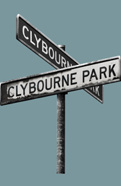Annie Parisse on How Clybourne Park's Long Journey to Broadway Created a Stage Family
About the author:
The Pulitzer Prize-winning play Clybourne Park is anything but cuddly: Bruce Norris’ acid comedy, inspired by A Raisin in the Sun, examines racism in America as filtered through the story of what happens in a suburban Chicago house in 1959 and 2009. In one of the happiest surprises of the season, the original 2010 off-Broadway cast has reunited to bring the play to Broadway, again portraying different characters in each act. The super-talented cast of seven includes Annie Parisse, who jumped from Law & Order to a series of admired stage performances in Prelude to a Kiss, Becky Shaw and last summer’s Shakespeare in the Park double feature of Measure for Measure and All’s Well That Ends Well. In Clybourne Park, Parisse plays Betsy and Lindsey, two women with nothing in common other than the fact that both are pregnant. Broadway.com asked Parisse to reflect on her two-and-a-half-year-long journey with the play, which she says has been a lot happier and more mellow than the script.
![]()
I first read Clybourne Park when I was four and a half months pregnant. Tim Sanford, artistic director of Playwrights Horizons, had sent me the script to do the first public reading of the play. Although I knew I wouldn’t be able to do it because the reading was scheduled for the day I was flying to the UK for my last pre-baby international vacation, I started skimming the play anyway because I knew and loved Bruce Norris’ writing—and I found I couldn’t put it down. I literally brought my suitcase to the reading and went directly to the airport so I could participate. The room during the reading was electric! So much so, that I called my agent from the taxi on the way to the airport asking him to make sure I got an audition for the play if he ever heard it was being produced.
Later that summer, when I was about six months pregnant, I ran into Bruce at the opening of another show at Playwrights Horizons, and he mentioned that he had wanted me to play Betsy and Lindsey in the winter 2010 premiere of the play, but Tim told him I couldn’t because I was pregnant. I immediately set him straight: “Oh, no no! My son’s due in October.” Shortly thereafter, I was offered the part.
Clybourne Park was my first job after the birth of my son, who was 11 weeks old when we started rehearsals. And while that was truly harder than anything I’ve ever done, I was grateful every day to be going to work on such an incredible play, with such a generous, intelligent, supportive group of people. Our experience at Playwrights was very exciting. The audiences were enthusiastic, and we began to hear little murmurs that the show might continue after Playwrights on Broadway. Of course, that didn’t happen right away.
I was disappointed, but the truth is, I didn’t really think about Clybourne Park on Broadway again after we closed at Playwrights Horizons. Just about every actor I know (myself included) has been in some wonderful show off-Broadway where everyone says: “This is gonna move!” Or “This belongs on Broadway!” And, of course, that almost never happens. So I was more than a little surprised when the notion of a Broadway production of Clybourne Park resurfaced last fall.
My son had just turned two when we started rehearsals to go to the Mark Taper Forum in Los Angeles en route to Broadway, and literally every person from the Playwrights production was involved again—a testament to what an incredible piece of writing this is.
In the intervening two years, two of the other actors in the show, Brendan Griffin and Christina Kirk, had had babies, and our assistant costume designer was pregnant. An especially sweet parallel for me: Christina’s daughter was just a few weeks younger when we started this time around than my son had been when we started a Playwrights. While we were performing in L.A. my son played a weekly soccer game with Jeremy Shamos’ two kids.
I know it sounds cheesy, and actors say this kind of stuff all the time, but it really does feel as if this group has become a family. And it’s so incredible that this family gets to go to Broadway together. I’m telling you: This stuff just doesn’t happen.
If you had asked me almost three years ago when I first read the play what Clybourne Park was about, I would have said: racism in America. And it is. I’ve also thought over the years it’s about communication. And that's true, too. I’ve found that part of the pleasure of being involved with this project over such a significant chunk of time is the revelation of a subtler more personal theme. This play starts with a family, and for me it has created one. Sharing a Broadway stage with this Clybourne Park family is again, for me, electric.

